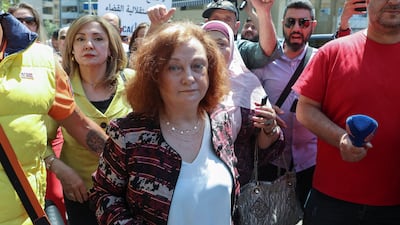Lebanese public prosecutor Ghada Aoun has filed new charges against Central Bank Governor Riad Salameh, his wife Nada Karam and actress Stephanie Saliba on suspicion of illicit enrichment.
Ms Aoun asked Mount Lebanon's first investigating judge Nicolas Mansour to issue arrest warrants against the trio in their absence.
The charges on Friday came days before Mr Salameh was scheduled to attend a court hearing in France, one of at least six European countries where he is being investigated for allegedly embezzling more than $330 million from the central bank with the help of his relatives.
Reports say French judiciary officials have notified Mr Salameh of their intention to press preliminary charges of fraud and money laundering during his hearing on Tuesday.
Ms Aoun confirmed to The National that she obtained documents during the raid of the governor's residence last year, which she claims provide evidence of illicit enrichment, from which his wife also allegedly benefited.
She also looked into Lebanon's land registry, where she found that Lebanese actress Ms Saliba, who is known to be close to the governor, owned high-value real estate properties registered in her name.
The actress was briefly detained in December upon her arrival in Beirut, after Ms Aoun brought charges against Mr Salameh for allegedly using misappropriated money to buy Ms Saliba gifts including property.
Ms Aoun also lodged a complaint against Lebanon and Gulf Bank, where Ms Saliba allegedly holds most of her money.
Since she was dismissed from her office on May 4, Ms Aoun has appealed against the decision before the High Disciplinary Court and remains in her position until a final ruling is reached.
The reasons behind her dismissal have not been disclosed, but Ms Aoun has been criticised in the past for her unconventional methods.
She has a history of pursuing high-ranking officials and banks during the severe economic crisis that has unfolded in the country since 2019, after decades of mismanagement and public funds being squandered.
She made headlines in March last year when she charged Riad Salameh and his brother Raja Salameh with illicit enrichment.

She requested the detention of Raja Salameh, who was jailed for two months in 2022, before he was released on a record bail of approximately 100 billion Lebanese pounds ($3.7 million).
Ms Aoun tweeted: “Did I make a mistake when I opened the file on Riad Salameh [ …] discovering the waste, abuse of power, and subsequent manipulation of the bank's budgets? Did I make a mistake when I looked into the lawsuits of depositors who lost their lifelong earnings?”
She also initiated legal proceedings against Lebanon's Bankmed on Tuesday amid allegations of money laundering.
The financial institution did not comment.
Lebanon's banking lobby, the Association of Banks in Lebanon, said on Thursday that “prosecutors continue to prosecute certain banks and change the criminal description of the offence by inappropriately qualifying it as a suspected money laundering offence”.


